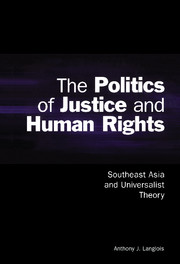Book contents
2 - The Real Asian Values Debate
Published online by Cambridge University Press: 05 July 2014
Summary
The debate over Asian values is often waged within the context of arguments over democracy and human rights. But, rather than there being a singular set of Asian values which opposes the values of the West, there are many Asian views, some of which contradict one another. These various views also pose questions about how the concept of human rights should be understood. These are questions about the ontological, epistemological and substantive axiological nature of human rights. Focusing this chapter on human rights thus problematises the notion of human rights, as well as the notion of Asian values.
Much has been claimed about the notion of Asian values. It is a significant observation that the great majority of these claims, whether they are made by proponents or critics of the notion, are generalisations which purport to speak on behalf of others, often all others, in the region. Senior political leaders speak of Asian culture in a way which suggests that the people under their leadership all share alike in this culture. Critics of Asian values deride this totalising representation and suggest instead that human rights are universal, the same for Asians as for Westerners. Much of the literature implicitly argues along this dichotomy: that proponents of Asian values are using the idea for political purposes and that the idea is demonstrably wrong; furthermore, that human rights are the same for all of us, that beyond our apparent differences the same universal and fundamental values are affirmed.
- Type
- Chapter
- Information
- The Politics of Justice and Human RightsSoutheast Asia and Universalist Theory, pp. 46 - 72Publisher: Cambridge University PressPrint publication year: 2001



